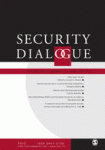The domopolitics of Japanese human security
Security Dialogue, Vol. 43, No. 2, 2012
Japan’s approach to human security has commonly been regarded as progressive, imbued with liberal internationalist commitment. In this article, I offer an alternative and critical perspective on Japanese human security, arguing that the mainstream understanding neglects some important features of the phenomenon. I pay attention to the tight links between Japanese discourses and practices of international development and humanitarian assistance, refugee policy, counter-terrorism, and NGO regulation. So far, these issue areas have only been examined separately in the literature, thereby obscuring the strong affinities of human security to national security and non-liberal bureaucratic control. I argue that once the international and the domestic sides of Japanese human security are studied together, the approach can no longer be understood as resting on a combination of liberal values and ‘Asian’ values. Instead, it needs to be studied through a domopolitical diagram concerned with national security – that is, governance in the image of the home, linking citizenship, state and territory. After an initial discussion of the notion of domopolitics and its conceptual extension to the Japanese context, the article investigates the domopolitical relationship between Japanese human security as practised in Afghanistan and Japan’s domestic refugee policy. It continues by examining the emergence of juridico-bureaucratic administration of NGOs within the domestic context and its subsequent extension to the area of Japanese human security, before ending with a few concluding remarks.

